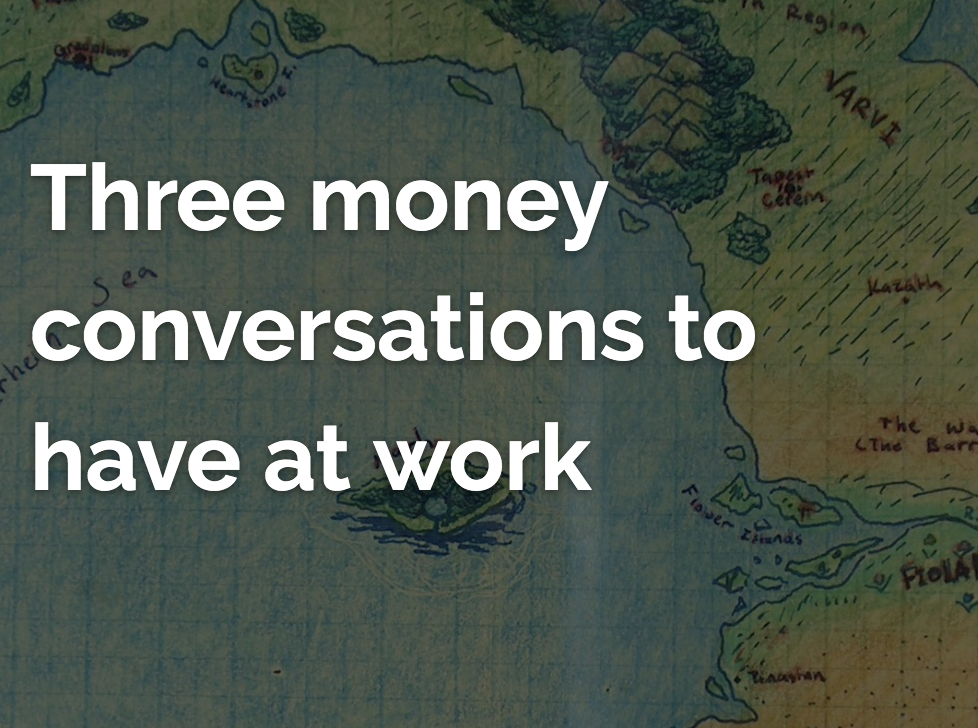When a Quarters Clubber told me recently that she’d asked to get her salary raised to match her coworkers’ — and got a $10k bump AND back pay from the ask, I a) teared up in joy, and b) starting thinking about what it takes to have these conversations.
Courage. Data. Insider information. Practicing sentences in front of a mirror (or was that just me?)
Then, another Ride Free client reached out to let me know they’d collectively bargained for a raise with their coworkers after we’d talked about the value of their labor.
Oh hell, yes. It’s time, folks.
Talking about money, with others, at the places where we make money, matters A LOT.
Like the difference between paying down your debt or not a lot. Like saving up for that trip you’ve been dreaming about a lot. Like going to work with your head high a lot.
Let’s get to talking about money, at work.
Here are three money — salary and hourly — conversation starters you can use at work, in your networks, or with total strangers on the internet. They range from collaborative to curious to clear asks.
1. What do you think we need to do to raise our salaries?
This is meant to be a generative, collaborative question.
Generally everyone would be happy with a bump in pay — and making it a shared responsibility acknowledges all the people it takes to make a business run and have money to pay people in the first place.
Especially if you work in a small business, or in a place where you have some impact on the salary setting (you do business development, you work for a grant-funded org, you bill hourly, etc) — or even if you work for yourself — this question is one often you’ll need to have an answer to, in order to get a raise in pay.
Versions of this include: “What do you think we need to do to raise your salary” and “What do I think I need to do to raise my salary?”
2. How much do you make?
Classic. Direct. Tends to make people pause, which is fun.
For coworkers, less direct versions of this include, “What’s your salary band?” or “What title are you paid as? What does that title make, usually?” If someone wants to share their salary, this is their chance to do so, or to mask it behind ranges or generalizations if they prefer.
For strangers, follow up with, “What city are you in, what’s your title, and how long have you been in your role/career?”
For friends, also ask, “How did you end up with that salary? Would you change anything if you could negotiate it again?”
3. I’d like to be paid $X, and here’s why
There’s three important parts of this statement: first, it’s not a question. Second, you’re naming a number. Third, you’re giving some reasoning.
TIP: The first time you try this one on, it doesn’t have to be with your boss.
For example, you could be telling yourself for the first time what you’d actually like to be paid.
You could be telling your mentor to get feedback.
You could be in a holocratic organization where you set your own salaries, and be telling your team.
You could be telling a friend as you practice for that Big Boss conversation.
Examples:
“I’d like to be paid $45,000 because my research indicates that it’s the median salary for other folks doing the same work at this level in this city — here, let me show you.”
“I’d like to be paid $175,000, and it’s because I know I save every team I work with at least 2 weeks of downtime when we problem-solve together, which means after I’ve worked with seven teams I save the company the equivalent of my salary for the year — and I usually work with four teams a quarter.”
“I’d like to be paid $92,000 because Mike, who got hired after me makes $90,000, and I believe I bill more hours than he does.”
“I’d like to be paid $110/hour average, for every hour I bill, because that will allow me to easily cover my needs, redistribute and share resources, and work no more than 30 hours/week.”
If you’ve had a conversation like this recently, or if you try out one of these prompts, leave a comment to tell me how it goes!
